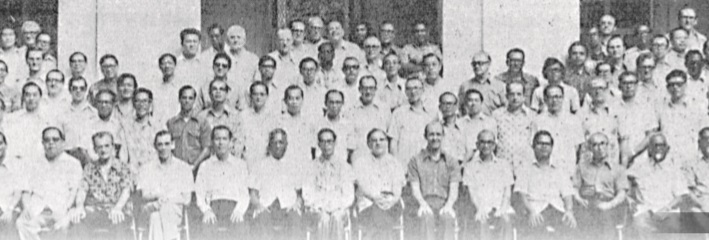The force behind the Aggiornamento 1976
While the late Cardinal Anthony Soter Fernandez may be remembered for his many contributions while leading the flock in Malaysia, among his early, outstanding achievements which left an indelible mark is the reform and renewal efforts he spearheaded, including bringing to life the Aggiornamento (Renewal Course) in 1976.
Nov 04, 2020

While the late Cardinal Anthony Soter Fernandez may be remembered for his many contributions while leading the flock in Malaysia, among his early, outstanding achievements which left an indelible mark is the reform and renewal efforts he spearheaded, including bringing to life the Aggiornamento (Renewal Course) in 1976.
He was sent for further studies and had attended renewal courses for a year at the International Training Institute for World Churchmen and the East Asian Pastoral Institute (EAPI), Manila. He also attended the Intensive Training Institute at the National Biblical Catechetical-Liturgical Centre (NBCLC) in Bangalore.
His return marked the point in his life when he started tackling reform and renewal constructively.
In 1975, the idea of bringing EAPI staff to Malaysia was mooted and proposed to the Bishops’ Conference of Malaysia and Singapore in August 1975. Fr Soter Fernandez was entrusted with the task of preparing the Aggiornamento by the Conference of Bishops.
Why Aggiornamento? Bishop Dominic Vendargon, who had attended Vatican Council II (1962-1965), was frustrated at the slow pace of change taking place even after many years of cursory study of Vatican II and its implications. The newly ordained Bishop James Chan of Melaka Johor had experienced a postVatican II Renewal programme at the EAPI and also felt strongly that a renewal of the clergy and people had to start somewhere.
Fr Soter and the six members of Five Loaves and Two Fishes formed the Facilitating Team and were given the task of intiating the renewal process in the Church in Peninsular Malaysia.
The renewal for all priests in the three dioceses in Peninsular Malaysia was held in August 1976 for an entire month and was known as the Aggiornamento.
For the first time, the laity were left to fend for themselves in the absence of their priests. The period was also meant to serve as a wake-up call for the laity to understand the realities of their faith, deepen their Christian commitment and love of Jesus.
Though unprecedented at that time, the laity in all the parishes was prepared to undertake the various tasks usually carried out by the priests, while the 123 priests and three bishops huddled at the Major Seminary in Penang for the entire month.
As a result of the one-month long study and reflection during the Aggiornamento 1976, the building of the Basic Christian Communities was identified as the Core Need, while the four Related Needs were listed as Unity, Formation, Ecumenical and Interreligious Dialogue and Integral Human Development.
The Core and Related Needs were to be implemented over the next 10 years from 1976-1986 at the diocesan and parish levels. One way was through the New Image of the Parish (NIP) programme.
Each diocese came up with its own Core Need and Four Related Needs which were then woven into a single plan for the nation: Inter-Diocesan Peninsular Malaysia.
The Related Needs were listed as: Unity among Bishops, priests, religious and laity in all fields and Formation as an ongoing process of all groups to produce committed and motivated lay leaders.
Included in the plan was the formation of Christ-centred Communities (at all levels) with an emphasis on dialogue with Christians and non-Christians and Integral Human Development of the Poor.
This plan formed the basis of the changes and renewal that has swept through the three dioceses since then.
In 1986, the Peninsular Malaysia Pastoral Convention (PMPC) gathered to evaluate the progress of the local churches since the Aggiornamento 1976. Another area of concern, Youth, was identified.
When asked in an interview about his role in running the Aggiornamento after he was appointed Bishop of Penang Diocese in 1977, the ever-humble then Bishop gave credit to the Conference of Bishops for giving him the opportunity to translate into action his learnings from EAPI and NBCLC in Bangalore.
He said then that the success or failure of the Aggiornamento rested with the 126 participants, himself included. Though ordained a bishop a year later, he still maintained that he had promises to keep to fulfil his role to push ahead with the reforms spelt out during the Aggiornamento. — By Regina William
Five Loaves and Two Fishes
There were some priests, religious brothers and sisters who had gone through renewal programmes at the East Asian Pastoral Institute (EAPI), Manila.
These seven graduates of EAPI were promoting renewal through the publication of a bimonthly catechetical leaflet for the formation of adults in family groups under the catchy name of Five Loaves and Two Fishes.
For almost four years (Jan 1976 to Dec 1979), the leaflets went out regularly to almost all parishes in the country much to the appreciation of the clergy and people alike.







Total Comments:0